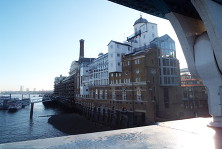
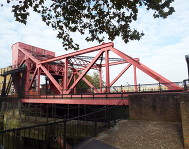
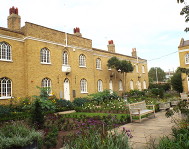
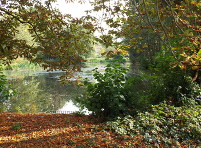

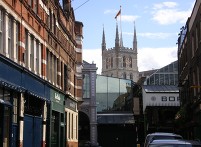



Tollgate, College Road, Dulwich
The tollgate in College Road, Dulwich is the last remaining tollgate in London. They were first established in the seventeenth century and known as turnpikes, named after pikestaffs that were laid across a road to prevent access until payment had been made. The use of tollgates grew in the 18th century and Turnpike Trusts were formed to operate them who then used the money raised through tolls for the upkeep of the roads.
However, the tollgate and road in Dulwich were not built and operated by a Trust. The road, originally named Penge Road, was built in 1789 by John Morgan, Lord of the Manor of Penge, who leased grazing land from Dulwich College at the end of Grange Lane. The new road connected Dulwich to Penge and Morgan charged a toll from users of the road for its maintenance. When his lease expired, Dulwich College took over the road, its maintenance and the charging of tolls. A toll-keeper's cottage was built in about 1821 which is now Grade II listed, and the road renamed College Road in 1872 after the building of the new Dulwich College that faced onto the road. As the road has remained private and does not come under the care of the London Borough of Southwark, the Dulwich Estate is still able to charge a toll which keeps the road quiet with a very low volume of traffic.
The toll-booth was installed in 1993 as the simple barrier across the road did not meet Health and Safety regulations. A weather-vane, made by pupils at Dulwich College, was included as part of the design but there were fears it might be stolen so was not installed. This situation was rectified in 2008. There is a notice to the side of the toll-booth which shows a table of tolls charged. No date is given but as it lists the charges for both motorised transport and “for every Horse, Mule or Donkey drawing any Vehicle” I’m guessing it dates from the beginning of the 20th century. Today the charge is £1 per vehicle with discounts available to those who live nearby.
Web discoveries
- UK Casino Not On Gamstop
- UK Casino Not On Gamstop
- Non Gamstop Casino
- Casinos Not On Gamstop
- Non Gamstop Casinos
- Non Gamstop Casinos
- Non Gamstop Casino
- Casinos Not On Gamstop
- Casino Sites Not On Gamstop
- Slots Not On Gamstop
- Casinos Not On Gamstop
- UK Betting Sites Not On Gamstop
- UK Casino Not On Gamstop
- Best Non Gamstop Casinos
- Betting Sites
- Non Gamstop Casino Sites UK
- Best Non Gamstop Casinos
- Non Gamstop Casino
- Casinos Not On Gamstop
- Non Gamstop Casino Sites UK
- Horse Racing Betting